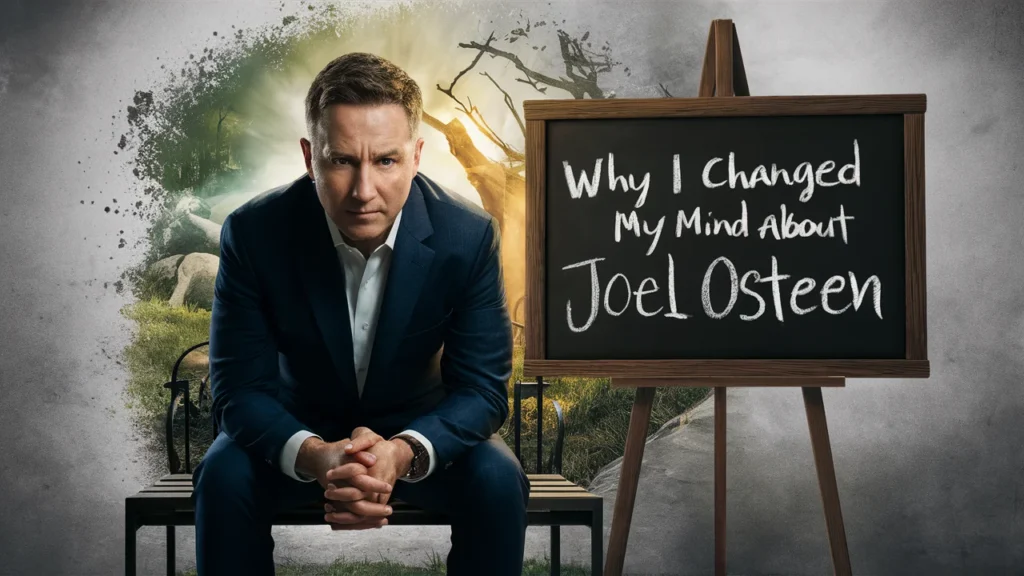In this blog post, I’ll explain why I changed my mind about Joel Osteen. From common criticisms to surprising revelations, we’ll dive deep into what makes him one of the most polarizing figures in modern Christianity. Along the way, I’ll share examples, facts, and insights that might challenge your perspective too.
Joel Osteen is a name that sparks strong opinions. Whether you’re familiar with his televised sermons, bestselling books, or Lakewood Church, you’ve likely heard people praising or critiquing his approach. For years, I aligned with the critics. Joel Osteen represented the epitome of shallow, feel-good preaching smiles and no substance. But something shifted. Over time, I began to see a different side of Osteen that challenged my assumptions.
The Preconception: Why Joel Osteen Faced Criticism
Common Criticisms of Joel Osteen
Joel Osteen’s approach to preaching has drawn significant backlash over the years. Here are the most frequent criticisms:
- The Prosperity Gospel: Critics argue that Osteen preaches wealth and success as indicators of faith, which many see as a distortion of biblical teachings.
- Lack of Theological Depth: Some feel his sermons oversimplify complex Christian doctrines, focusing more on self-help than scripture.
- Overemphasis on Positivity: Osteen’s consistent optimism can come across as dismissive of real struggles, leading to accusations of toxic positivity.
Why These Criticisms Matter
These critiques aren’t unfounded. For example, the Prosperity Gospel is often at odds with Christian teachings about humility and sacrifice. A 2020 Pew Research Center survey found that many Americans feel uneasy about religious leaders who prioritize wealth and success.
For years, I agreed with these concerns. I saw Joel Osteen as a televangelist focused on fame and fortune rather than genuine faith.
The Turning Point: What Changed My Perspective
A Personal Experience That Sparked Change
My perspective began to shift after watching a sermon during a particularly challenging time in my life. Osteen’s message, “Your Setback Is a Setup for a Comeback,” felt oddly relevant. His words didn’t solve my problems, but they gave me a sense of hope I hadn’t felt in a while.
“You cannot expect to live a positive life if you surround yourself with negativity.” – Joel Osteen
This quote stuck with me. While I initially dismissed it as overly simplistic, I realized later that sometimes, people don’t need complexity-they need encouragement.
The Power of Accessibility
Joel Osteen’s sermons are easy to understand, even for those new to Christianity. He avoids theological jargon, making his messages accessible to millions.
Case Study: A 2018 study by Lifeway Research revealed that 46% of Americans who engage with Osteen’s content are new to faith, suggesting his approach resonates with beginners.
The Evidence for Change: Why Joel Osteen Deserves Another Look
Real-Life Impact of His Teachings
Joel Osteen’s ministry has transformed countless lives. Here are some examples:
| Testimonial | Impact |
| Anna from Texas | Found hope after losing her job; inspired to start a business. |
| James in New York | Overcame depression after listening to Osteen’s sermons daily. |
| Martha in California | Reconnected with her faith after years of doubt. |
These stories highlight the practical, emotional, and spiritual benefits of his work.
Breaking Down the Positivity Critique
Critics often dismiss Osteen’s optimism, but there’s evidence that positivity can have profound effects:
- Harvard Business Review: Positive thinking enhances resilience during hardships.
- Johns Hopkins Study: Optimism is linked to better cardiovascular health.
By focusing on hope, Joel Osteen offers more than feel-good Platitudes provides a psychological and spiritual lifeline for many.
Addressing the Critics: A Balanced Perspective
Common Myths vs. Realities About Joel Osteen
Here’s a breakdown of major criticisms and counterpoints:
| Criticism | Reality |
| Preaches only wealth | Many sermons focus on overcoming personal struggles. |
| Ignores scripture | Frequently references Bible verses in relatable contexts. |
| Dismissive of struggles | Acknowledges hardships while encouraging faith and persistence. |
While his approach isn’t for everyone, it’s clear that his teachings fill a gap for those seeking encouragement in difficult times.
Real-World Example
Consider Hurricane Harvey in 2017. Critics accused Osteen of not opening his church quickly enough to evacuees. However, once Lakewood Church became a shelter, it housed thousands of displaced families. This incident shows that while mistakes can happen, his actions ultimately reflect a desire to serve.
Broader Implications: What This Change Taught Me
Lessons About Judging Public Figures
Changing my opinion on Joel Osteen taught me the importance of keeping an open mind. Public figures are often reduced to soundbites and headlines, which rarely capture their full impact.
The Value of Evolving Perspectives
This journey reminded me that evolving our opinions isn’t a sign of weakness-it’s a sign of growth. Whether you love or criticize Joel Osteen, there’s value in reevaluating your assumptions.
Conclusion
Joel Osteen isn’t perfect, but neither are we. His teachings might not resonate with everyone, but they’ve undeniably brought hope to millions. For me, the shift in perspective wasn’t about agreeing with everything he says; it was about understanding the value he provides.
If you’ve dismissed him outright, I encourage you to look further. Sometimes, the people we least expect can surprise us the most.
FAQs
What is Joel Osteen known for?
Joel Osteen is a pastor, author, and televangelist known for his optimistic sermons and focus on personal empowerment through faith.
What is the Prosperity Gospel?
The Prosperity Gospel teaches that faith and positive declarations can lead to material wealth and success. It’s a central point of criticism against Joel Osteen.
Has Joel Osteen faced controversies?
Yes, he’s faced criticism for his wealth, theology, and response to events like Hurricane Harvey.
Does Joel Osteen reference the Bible in his sermons?
Yes, Osteen frequently cites Bible verses, though some argue his interpretations prioritize accessibility over depth.
How can I access Joel Osteen’s content?
You can find his sermons on YouTube, his books in major bookstores, and podcasts on various platforms.

Alyan Ashraf is a creative visionary and passionate writer, committed to delivering engaging and thought-provoking content. With a talent for storytelling and an eye for detail, Alyan focuses on connecting with readers through topics that matter.

